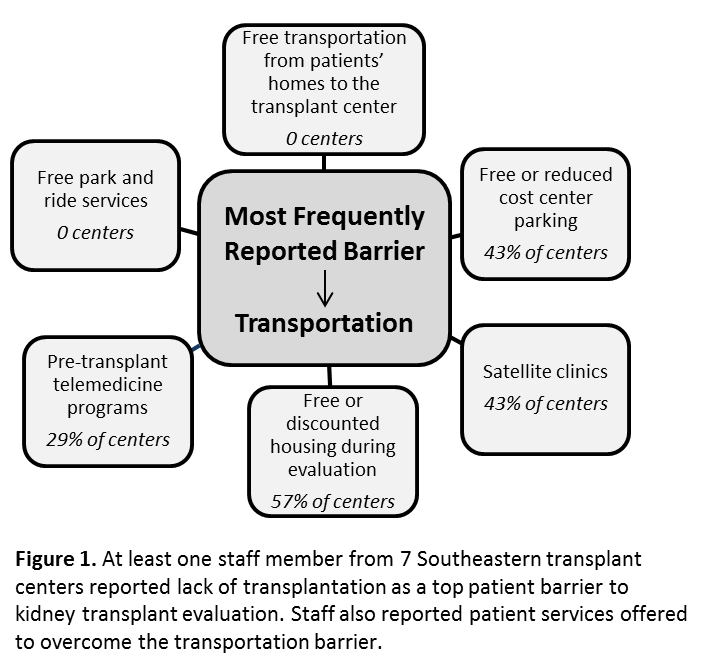Perceived Patient Barriers for Kidney Transplant Evalution Among Transplant Center Staff.
Emory University, Atlanta, GA
Meeting: 2017 American Transplant Congress
Abstract number: C73
Keywords: Multicenter studies
Session Information
Session Name: Poster Session C: Disparity in Access and Outcomes for Solid Organ Transplantation
Session Type: Poster Session
Date: Monday, May 1, 2017
Session Time: 6:00pm-7:00pm
 Presentation Time: 6:00pm-7:00pm
Presentation Time: 6:00pm-7:00pm
Location: Hall D1
Background: The Southeastern United States has the lowest rates of kidney transplant in the nation. Disparities in transplant access among end stage renal disease (ESRD) patients may be attributable to the initial stages of the transplant process, including transplant evaluation. Transplant center providers have yet to be surveyed about patient evaluation barriers and center practices. We aimed to identify transplant center staff perceived patient barriers to kidney transplant evaluation.
Methods: We emailed a 54-item survey to transplant coordinators and social workers at 9 transplant centers in North Carolina, South Carolina, and Georgia. We assessed staff perceived patient barriers to evaluation including the evaluation length, distance to transplant center, required medical testing, and services offered to reduce patient barriers, such as patient education and financial resources.
Results: A total of 34 coordinators and social workers from 7 centers completed the survey. Staff reported that the average number of patient evaluation visits is 2.1 (range: 1, 5) and 43% of centers require patients to complete >5 medical tests prior to evaluation. When asked to identify reasons why patients may not present for evaluation, staff reported lack of transportation to the transplant center (62%), lack of understanding about the transplant process (35%), and concerns about post-transplant medication costs (24%). To relieve travel-related concerns, some centers have satellite clinics (43%), telemedicine programs (29%), reduced parking costs (43%), and discounted overnight housing (57%).  Prior to evaluation, some centers require patients to complete in-person (29%) or online (14%) transplant education sessions. None of the centers require patients to fundraise prior to evaluation and 4 centers give patients an opportunity to speak with a financial coordinator prior to evaluation start.
Prior to evaluation, some centers require patients to complete in-person (29%) or online (14%) transplant education sessions. None of the centers require patients to fundraise prior to evaluation and 4 centers give patients an opportunity to speak with a financial coordinator prior to evaluation start.
Conclusion: Understanding transplant staff perceived barriers to evaluation may help inform center-specific interventions to increase evaluation rates among ESRD patients, and also ensure providers are aware of their center's policies so they can be better communicated to patients.
CITATION INFORMATION: McPherson L, Lipford K, Hamoda R, Gander J, Pastan S, Patzer R. Perceived Patient Barriers for Kidney Transplant Evalution Among Transplant Center Staff. Am J Transplant. 2017;17 (suppl 3).
To cite this abstract in AMA style:
McPherson L, Lipford K, Hamoda R, Gander J, Pastan S, Patzer R. Perceived Patient Barriers for Kidney Transplant Evalution Among Transplant Center Staff. [abstract]. Am J Transplant. 2017; 17 (suppl 3). https://atcmeetingabstracts.com/abstract/perceived-patient-barriers-for-kidney-transplant-evalution-among-transplant-center-staff/. Accessed July 5, 2025.« Back to 2017 American Transplant Congress
